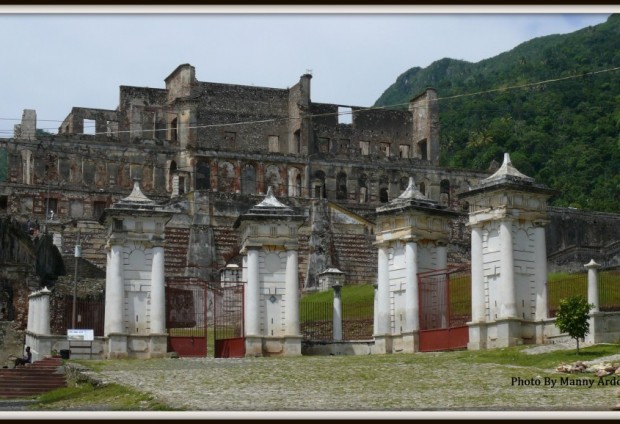Author’s Note: This story began as a family tale of history and migration from a father- daughter perspective, then increasingly appeared to parallel contemporary events, one document leading to another. Comments and links are included in the endnotes.
Les Cayes on my mind
As we share memories
Now in my bed and about to take a nap, I look at my two youngest grandchildren playing on the floor where I can see them. The girl is about three, the little boy nearly two. Both strong, healthy, innocent. I see their parents at that age, and feel blessed. My wife comes and goes between the bedroom, the kitchen, and the living room where the two older boys are playing at whatever they play nowadays. Both were born in this country, the oldest–my first grandchild–nearly fifteen and his cousin about eight years old. Our six other grandchildren who live in Haiti often come for vacations, and then fill our Queens apartment along with their local cousins. They play, fight, run, and my wife loves it all. Sometimes, she has to tell them that she will have me intervene when things really tend to get out of hand; as it was with their parents, our six children.
So much is now different here in New York, and some has not changed from the way we used to live in Haiti. Old and new friends drop by unannounced and always have a place at the table, except that now they have to ring a bell and be let in. Often, they tease about my large family and call me a deserving citizen: “Tu as bien mérité de la patrie,” they say.
I watch the babies play and see my daughter looking at me. We smile.
I feel at peace. My work is done.
Vive la Revolution ! (Long live the Revolution!)
I remember the day when my mother took my two older brothers, baby sister, and me to the safety of the British consulate across from our house on Main Street, when word of the newest revolution broke out. As a surveyor, my father was frequently out of town and, in those days of political turmoil, the plan was for us to go immediately to the consulate, which was also the home of my mother’s half-sister, then married to the consul.
About to cross the street, we saw the revolutionaries on horseback galloping fiercely in our direction. My mother stood, gathering us. There would be no time to reach the consulate. The leader, armed to the teeth, had a scarf covering his face. He halted the troops as he reined his horse, lowered his scarf and yelled, “Madame, criez Vive la Révolution! (Madam, shout ‘Long live the Revolution!’)” My mother promptly did. “The children too,” he ordered, motioning for us to raise our arms. We complied, except for the baby, and all I understood and could repeat was “Ishion!”–for Revolution. That was apparently enough, and he let us pass.
The government quickly regained control of the town, then summarily tried and executed the rebel leader on the Main Square. He was tied to one of the cannons memorializing the Independence war, and the Catholic bishop came to offer the last rites. We did not live in that area and I did not see it happen, but my mother never missed an occasion to exhort us boys not to get involved in politics; my oldest brother, however, always appeared skeptical. Time passed and I shared the story with my children. I still remember.
__________
Granny’s circle
Everyone said that my father’s mother was a saint. She was a quiet child whom her sisters had raised after the death of her mother who, herself, had raised them after the death of their own mother, their father’s first wife. The two women had been close friends since their childhood. My great-grandmother, then an orphan, single, and godmother to one of the girls, had cared for her friend until her last moments and, upon her request, had promised her to remain with her little girls and help to raise them.
She thus joined the household, along with a sister of the dead wife—-for propriety’s sake, I suppose–as the father was a rather wealthy doctor, and a ladies’ man. The arrangement went well for years, at a time when many Haitian women had chosen not to marry, and shortly after new legal restrictions had become inherent to that status. With two “proper women” raising his daughters at home, the doctor found solace in the arms of many others who gave him several more daughters, some that he recognized legally depending upon the mother’s social status. One of those, the daughter of an independently wealthy and prominent business woman, later married the British merchant marine officer turned local consul.
The scandal broke years later. My great-grandmother who had been almost past child-bearing age was pregnant. Worse. The doctor, who had other “obligations” at the time, could not immediately get married. “She died of shame,” my mother said when I accidentally found out, while a cousin from the older branch thought that they had married on her deathbed or that he must had arrived too late to make it happen. The baby’s name–Sarah–meant “princess” and, as they raised her in the family home, the older sisters lavished upon her the love that they had themselves received from her mother.
When bayonets ruled (Sou rèy bayonèt)
My grandmother’s residences, both as a child and a young bride, were not far from he military headquarters on the Main Square. There lived General Antoine Simon, the long-time South Department commander, and his family. A friend of the Simon daughters, my grandmother occasionally joined them in preparing for official activities and receptions. While her husband worked independently, his two brothers and at least one cousin had followed a family tradition and opted for military careers; other relatives also served in the local administration during the General’s tenure.
Antoine Simon was respected in Les Cayes where he had been in post for nearly 26 years. When the government then in place in Port-au-Prince dispatched a newly-purchased warship to arrest him–unjustly it was said–the town rose. General Simon then led the disciplined Southern Army toward the capital and was hurriedly elected president of Haiti, as other candidates advancing from the North decided to withdraw their troops, amid concerns of an American intervention to protect foreign interests in case of civil war.
My father loved to share that story, one of his favorites about what had been called “the time when bayonets ruled.” To this day, some of us still remember the song of the 17th Regiment soldiers celebrating the final rout of government forces.
Functionaries from Les Cayes thus joined the new administration as cabinet ministers, diplomats, and in other capacities. My two great-uncles, both promoted, served as military commanders in towns near and far. The problems, however, began almost immediately. Soon after General Simon took office, a fire initially blamed on the government out-of-town political enemies–until it was discovered to have perhaps been accidental–ravaged Les Cayes and caused catastrophic economic losses from which many never recovered. My grandparents’ home was burned and the family forced to move. While producing results, the government attempt at modernization led to poorly executed contracts involving foreign interests, as well as displacement of small farmers in various areas of the country. Discontent rose and lead to unrest and military revolt, including the one my father had witnessed as he reached his sixth birthday. A few days later, the president left for exile. So did my great-uncles. The Simon presidency had lasted nearly three years.
In Les Cayes, the repercussions from the political crisis, so soon after the fire, profoundly affected a number of families. Fathers’ exile often forced children out of school, families out of homes and, if lucky, to countryside properties to live off the land. Mutual support seemed to have made it bearable. The American intervention of 1915 occurred in that context. My grandfather died seven years later at the age of 49.
My grandmother reached her seventies. Serene and good-natured, she was also a book lover who constantly read to her children and later guided them with courage and dignity through calamities, hardships, political upheavals, and early widowhood. And now, three and four generations later, several girls of the family continue to bear her name.
__________
Sleep takes me to Les Cayes. I am in the Cathedral with my mother, father, and other loved ones. They fill the church and it feels so good there. So peaceful. My only reason to return here is you, my family, I once told my daughter.
And she held my hand.
__________
My father died in July 1984; my mother two weeks later. I am now at peace with their story. Happy Anniversary Mom and Dad, wherever you may be.
Marie-Thérèse Labossière Thomas
January 20, 2014
Notes:
As I was writing this story, I tentatively searched the Internet for information on the revolt that my father had witnessed as a child, based upon the leader’s name. I found the following dispatch, dated July 29, 1911: http://query.nytimes.com/mem/archive-free/pdf?res=FB071EFE3E5517738DDDA00A94DF405B818DF1D3
For information on Haitian women in the 19th Century, see: Bouchereau, Madeleine Sylvain. Haïti et ses femmes. Port-au-Prince: Les Presses Libres, 1957.
Frederick Douglass on Haiti, January 2, 1893 : “…To their shame be it spoken, men in high American quarters have boasted to me of their ability to start a revolution in Haiti at pleasure. They have only to raise sufficient money, they say, with which to arm and otherwise equip the malcontents, of either faction, to effect their object. Men who have old munitions of war or old ships to sell; ships that will go down in the first storm, have an interest in stirring up strife in Haiti. It gives them a market for their worthless wares. Others of a speculative turn of mind and who have money to lend at high rates of interest are glad to conspire with revolutionary chiefs of either faction, to enable them to start a bloody insurrection….” Full text: http://www2.webster.edu/~corbetre/haiti/history/1844-1915/douglass.htm
About General Antoine Simon’s rise to the presidency:
Haiti Rebels Rout Government Troops: http://query.nytimes.com/gst/abstract.html?res=F2061FFB3A5A15738DDDA00A94D9415B888CF1D3
Haitian President Expected to Quit: http://query.nytimes.com/mem/archive-free/pdf?res=F60915F83A5A15738DDDAB0894DA415B888CF1D3
Rebel Army Now in Port-au-Prince: http://query.nytimes.com/mem/archive-free/pdf?res=F2071FFA3C5517738DDDAF0894DA415B888CF1D3
Hurry Election of Simon in Haiti: http://query.nytimes.com/mem/archive-free/pdf?res=F30B17FC3A5A17738DDDA10894DA415B888CF1D3



No comments yet.